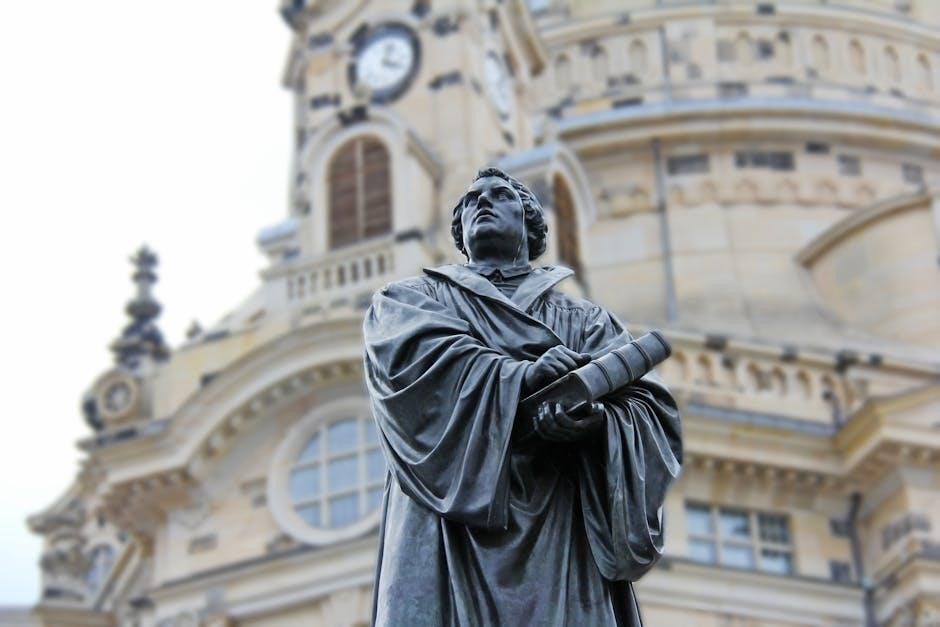Martin Luther, a German theologian, sparked the Protestant Reformation by posting his 95 Theses in 1517, criticizing Catholic Church indulgences and seeking reform․ His act challenged authority, inspiring widespread change and remains a foundational document in Christian history․ Today, the 95 Theses are widely available in PDF format, offering insights into Luther’s visionary critique and its enduring impact․
1․1․ Who Was Martin Luther?
Martin Luther was a German theologian, monk, and professor who became a pivotal figure in the Protestant Reformation․ Born in 1483, Luther challenged Catholic Church practices, particularly the sale of indulgences․ His 95 Theses, posted in 1517, critiqued these practices and sparked widespread reform․ Luther’s emphasis on faith over works resonated deeply, shaping modern Christianity and leaving a lasting legacy in religious history․
1․2․ Historical Context of the 95 Theses
The 95 Theses emerged amidst widespread dissatisfaction with the Catholic Church’s practices, particularly the sale of indulgences․ In early 16th-century Europe, the Church’s power was vast, but corruption and abuse fueled calls for reform․ Luther’s theses, posted in 1517, critiqued these abuses, challenging the Church’s authority and igniting the Protestant Reformation․ This act became a catalyst for profound religious and social change across Europe․

The Core Arguments of the 95 Theses
Martin Luther’s 95 Theses opposed the Catholic Church’s sale of indulgences, arguing they undermined genuine repentance and exploited the faithful․ He emphasized faith and grace over monetary transactions as the path to salvation, challenging Church practices and sparking theological debate․
2․1․ Critique of Indulgences
Martin Luther’s 95 Theses primarily criticized the Catholic Church’s sale of indulgences, arguing they exploited people’s fear of purgatory for financial gain․ He contended true repentance came from faith, not monetary transactions, and only God could grant forgiveness․ Luther’s critique highlighted the corruption within the Church, emphasizing spiritual reform over material gain․ His arguments challenged papal authority and sparked the Protestant Reformation, advocating for a return to biblical teachings․
2․2․ Key Points in Theses 15-82
Theses 15–82 form the core of Luther’s argument, focusing on the abuse of indulgences and their theological implications․ Luther challenged the idea that indulgences could guarantee salvation or remit sin, emphasizing that true repentance requires inner faith, not financial transactions․ He argued that the Pope’s authority did not extend to releasing souls from purgatory, as only God could forgive sin․ Luther’s critique exposed the exploitation of indulgences, advocating for a return to biblical teachings and sparking theological debate․

The Structure and Content of the 95 Theses
The 95 Theses begin with a call to repentance, followed by 95 arguments critiquing indulgences, emphasizing true repentance and God’s mercy over Church practices․
3․1․ The Purpose of the Theses
Martin Luther’s 95 Theses aimed to provoke theological discussion and reform within the Catholic Church, particularly challenging the sale of indulgences․ By questioning the Church’s authority to forgive sins through indulgences, Luther sought to redirect focus to repentance and God’s grace․ His intent was not to divide the Church but to spark a return to biblical teachings and true spiritual renewal․
3․2․ Major Themes and Biblical References
The 95 Theses emphasize repentance, faith, and God’s grace, citing biblical passages like Matthew 4:17 to argue against indulgences․ Luther stressed that true penance comes from inward sorrow, not monetary transactions․ He challenged the Church’s authority to sell forgiveness, advocating for a return to scripture and spiritual renewal through faith and divine mercy rather than human acts or payments․
The Historical Significance of the 95 Theses
The 95 Theses sparked the Protestant Reformation, challenging Catholic indulgences and leading to sweeping religious reforms across Europe, shaping modern Christian thought and practices historically․
4․1․ The Spark of the Protestant Reformation
Martin Luther’s 95 Theses, posted in 1517, ignited the Protestant Reformation by challenging Catholic Church practices, particularly indulgences․ This bold act questioned ecclesiastical authority, sparking widespread debate and inspiring reform across Europe․ The theses’ critique resonated deeply, leading to a theological and social movement that reshaped Christianity and laid the groundwork for modern religious diversity and freedom of conscience․
4․2․ Impact on the Catholic Church
The 95 Theses led to significant repercussions for the Catholic Church, prompting internal reforms and doctrinal clarifications․ The Church convened the Council of Trent to address Luther’s critiques, reaffirming traditional teachings while implementing measures to combat corruption․ This period of response and renewal shaped the Church’s trajectory, emphasizing theological precision and hierarchical authority in the face of rising Protestantism․
The Reaction to the 95 Theses
The Catholic Church opposed Luther’s views, sparking a theological debate․ His ideas spread rapidly, fueling the Reformation and challenging ecclesiastical authority across Europe․
5․1․ The Catholic Church’s Response
The Catholic Church vehemently opposed Luther’s 95 Theses, viewing them as a direct challenge to its authority․ Pope Leo X demanded Luther’s recantation, and when he refused, Luther was excommunicated in 1521․ The Church dismissed his critiques of indulgences as heresy, solidifying its stance and prompting further conflict․
5․2․ The Spread of the Reformation
Luther’s 95 Theses ignited a wave of reform across Europe, spreading rapidly due to the printing press․ Translations and distributions facilitated its reach, sparking debates and inspiring figures like Calvin and Zwingli․ The Reformation expanded beyond Germany, adapting to local cultures and languages, and reshaping Christianity’s landscape through grassroots support and theological innovation․

A Summary of the 95 Theses
Martin Luther’s 95 Theses criticized indulgences, emphasizing true repentance over monetary forgiveness․ This document sparked the Protestant Reformation and remains a pivotal historical text, now available in PDF format for study․
6․1․ Key Takeaways for Modern Readers
Martin Luther’s 95 Theses emphasize the importance of genuine repentance over indulgences, challenging Church practices․ The document highlights the need for spiritual reform and individual faith, resonating with modern readers seeking theological clarity․ Its critique of institutional corruption remains relevant, offering timeless lessons on integrity and the pursuit of truth․ The PDF version provides accessible insight into this foundational text of the Reformation․
6․2․ The Legacy of the Theses
The 95 Theses left an indelible mark on history, sparking the Protestant Reformation and reshaping Christianity․ Their critique of indulgences and emphasis on faith ignited a movement for religious freedom and reform․ Today, Luther’s ideas continue to influence theology, ethics, and social justice, ensuring the Theses’ enduring legacy as a cornerstone of modern Christian thought and practice, accessible through various PDF resources․
The 95 Theses in PDF Format
The 95 Theses are widely available in PDF format, preserving the original Latin text and modern translations․ This format ensures easy access for readers to study Luther’s seminal document․
7;1․ Availability of the PDF Version
The 95 Theses are readily available in PDF format, accessible through various academic and religious websites․ Multiple translations, including Latin and modern languages, ensure widespread readability․ The PDF version preserves the original structure and intent of Luther’s document, making it a valuable resource for historical and theological study․ Its digital format enhances accessibility for global audiences․
7․2․ Translations and Commentaries
Various translations of the 95 Theses exist, offering interpretations in multiple languages․ Scholarly commentaries, such as those by Timothy Wengert, provide context and analysis, enriching understanding of Luther’s arguments․ These resources help modern readers grasp the historical and theological significance of the document, making it accessible to a broader audience while maintaining its original intent and depth․

Modern Relevance of the 95 Theses
Martin Luther’s 95 Theses remain influential, emphasizing individual faith and critiquing institutional abuses, offering timeless lessons on spirituality and ethical religious practices for modern Christianity․
8․1․ Implications for Contemporary Christianity
The 95 Theses highlight the importance of spiritual integrity and individual faith, challenging institutional authority․ For modern Christianity, Luther’s critique of indulgences underscores the need for transparency and ethical practices within religious institutions․ His emphasis on direct communion with God resonates with contemporary movements seeking authenticity and reform, ensuring his ideas remain relevant in shaping Christian thought and practice today․
8․2․ The Ongoing Debate About Indulgences
Despite centuries since Luther’s critique, debates about indulgences persist․ Modern theologians question their validity, echoing Luther’s argument that true repentance comes from faith, not purchased forgiveness․ The Catholic Church maintains indulgences reflect divine mercy, yet critics argue they undermine genuine spiritual reform․ Luther’s 95 Theses PDFs highlight this enduring theological tension, sparking continued reflection and dialogue among scholars and believers alike․

Critical Analysis of the 95 Theses
Martin Luther’s 95 Theses challenged the Catholic Church’s indulgence system, sparking reformation․ While his critique was groundbreaking, some argue his biblical interpretations lacked depth, leading to theological controversies that persist today․
9․1․ Strengths and Weaknesses of Luther’s Arguments
Martin Luther’s 95 Theses demonstrated a bold critique of indulgences, highlighting their abuse and theological flaws․ His arguments, rooted in biblical scripture, challenged Church authority effectively․ However, some interpretations of Scripture were debated, and his call for reform unintentionally led to significant division․ While his critique sparked necessary change, it also revealed biases, such as later anti-Jewish sentiments, complicating his legacy․
9․2․ Historical and Theological Criticisms
Martin Luther’s later life revealed controversial views, such as anti-Semitism and support for polygamy, tarnishing his legacy․ Theologically, critics argue his rejection of certain sacraments and emphasis on justification by faith alone oversimplified complex doctrines․ Historically, his opposition to the Peasants’ Revolt and rigid views on social hierarchy have been criticized as contradictory to his earlier calls for reform and equality․

The 95 Theses and the Digital Age
The internet has revolutionized access to Martin Luther’s 95 Theses, enabling global dissemination through PDFs, translations, and online discussions․ Digital platforms foster engagement with this historical document․
10․1․ How the Internet Has Popularized the Theses
The internet has significantly increased the accessibility of Martin Luther’s 95 Theses through PDF versions, translations, and online discussions․ Digital platforms enable global sharing, fostering widespread engagement with Luther’s critique of indulgences․ Search engines and educational websites simplify access, while social media spreads awareness, making the document a cornerstone of modern theological discourse and historical study․
10․2․ The Role of PDFs in Preserving Historical Documents
PDFs play a crucial role in preserving historical documents like Martin Luther’s 95 Theses by maintaining their original formatting and integrity․ This format ensures that the content remains unchanged, offering a reliable source for research and education․ PDFs are widely accessible, making historical texts like Luther’s Theses available to a global audience, thus preserving their legacy for future generations․
Martin Luther’s 95 Theses remain a pivotal moment in history, challenging Church practices and inspiring reform․ Their legacy endures, with PDF versions ensuring accessibility for modern readers worldwide․
11․1․ Final Thoughts on the Importance of the 95 Theses
The 95 Theses are a cornerstone of religious and historical reform, highlighting the need for spiritual authenticity and challenging institutional power․ Their enduring relevance lies in their call for individual faith and accountability, reshaping Christianity’s trajectory․ Available in PDF, they continue to inspire reflection on Church practices and personal spirituality, ensuring Luther’s ideas remain vital for modern discourse․
11․2․ Encouragement to Explore the PDF Version
Exploring the PDF version of the 95 Theses offers a deeper understanding of Luther’s groundbreaking ideas․ This accessible format provides a comprehensive analysis of his arguments against indulgences, alongside historical context and theological insights․ Readers can gain a clearer perspective on Luther’s vision for reform and its lasting impact on Christianity․ The PDF is an invaluable resource for both scholars and general readers seeking to engage with this pivotal document․



